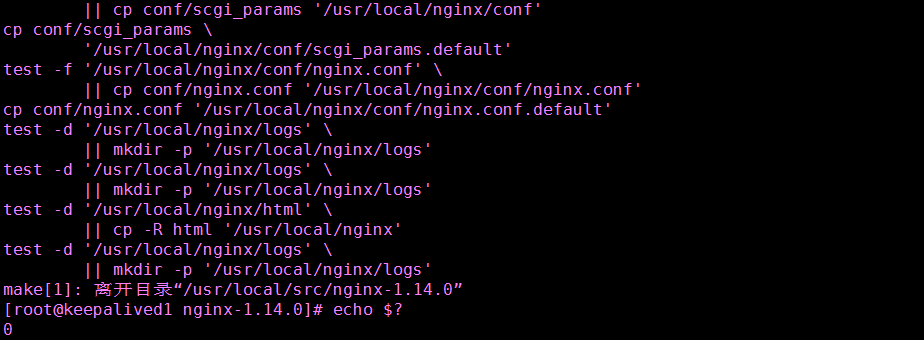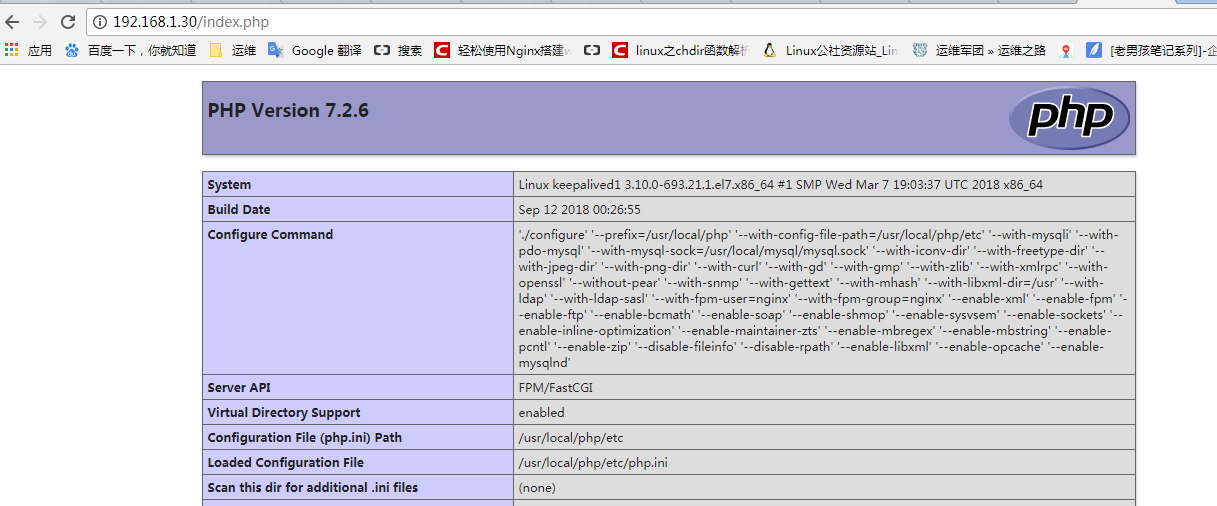一、下载阿里云网络yum源
[root@centos7_4 ~]# wget http://mirrors.aliyun.com/repo/Centos-7.repo -P /etc/yum.repos.d/ #这里安装的是阿里的网络源,epel扩展源,也可以安装阿里的,但是阿里的epel源有些包不全,所以下面就直接用yum安装网络epel源 [root@centos7_4 ~]# yum -y install epel-release [root@centos7_4 ~]# yum clean all;yum makecache
二、编译安装nginx
源码编译安装nginx 2.1 安装依赖包: [root@centos7_4 ~]# yum -y install gcc gcc-c++ autoconf automake zlib zlib-devel openssl openssl-devel pcre* 2.2 创建nginx运行用户 [root@centos7_4 ~]# useradd -M -s /sbin/nologin nginx 下载pcre包 [root@centos7_4 ~]# wget https://jaist.dl.sourceforge.net/project/pcre/pcre/8.42/pcre-8.42.zip [root@centos7_4 ~]# unzip pcre-8.42.zip -d /usr/local/src/ 2.3 下载nginx源码包并解压 [root@centos7_4 ~]# wget http://nginx.org/download/nginx-1.14.0.tar.gz [root@centos7_4 ~]# tar zxf nginx-1.14.0.tar.gz -C /usr/local/src/ [root@centos7_4 ~]# cd /usr/local/src/nginx-1.14.0/ [root@centos7_4 nginx-1.14.0]# ./configure --prefix=/usr/local/nginx \ --with-http_dav_module \ --with-http_stub_status_module \ --with-http_addition_module \ --with-http_sub_module \ --with-http_flv_module \ --with-http_mp4_module \ --with-http_ssl_module \ --user=nginx \ --group=nginx \ --with-pcre=/usr/local/src/pcre-8.42 #这个是可选项,如果yum安装了依赖包这里也可以不用
2.4 编译安装
[root@centos7_4 nginx-1.14.0]# make && make install

2.5 上面报错不用管,echo $? 验证是否成功
[root@centos7_4 nginx-1.14.0]# echo $?
0
2.6 添加环境变量,优化nginx服务
[root@centos7_4 ~]# /usr/local/nginx/sbin/nginx -t #检查nginx语法是否正确
nginx: the configuration file /usr/local/nginx/conf/nginx.conf syntax is ok
nginx: configuration file /usr/local/nginx/conf/nginx.conf test is successful
[root@centos7_4 ~]# vim /etc/profile #添加环境变量,/usr/local/nginx/sbin/nginx #安装好的启动路径
export PATH=$PATH:/usr/local/nginx/sbin
[root@centos7_4 ~]# source /etc/profile
[root@centos7_4 ~]# nginx
[root@centos7_4 ~]# netstat -antup|grep nginx
tcp 0 0 0.0.0.0:80 0.0.0.0:* LISTEN 7417/nginx: master
[root@centos7_4 ~]# vim /etc/init.d/nginx #配置启动脚本
#!/bin/bash
# chkconfig: 2345 99 20
#description: nginx-server
nginx=/usr/local/nginx/sbin/nginx
case $1 in
start)
netstat -anptu | grep nginx
if [ $? -eq 0 ]
then
echo "nginx service is already running"
else
echo "nginx Service started successfully "
$nginx
fi
;;
stop)
$nginx -s stop
if [ $? -eq 0 ]
then
echo "nginx service closed successfully"
else
echo "nginx server stop fail,try again"
fi
;;
status)
netstat -anlpt | grep nginx
if [ $? -eq 0 ]
then
echo "nginx server is running"
else
echo "nginx service not started "
fi
;;
restart)
$nginx -s reload
if [ $? -eq 0 ]
then
echo "nginx service restart successfully "
else
echo "nginx server restart failed"
fi
;;
*)
echo "please enter {start restart status stop}"
;;
esac
[root@centos7_4 ~]# chmod +x /etc/init.d/nginx
[root@centos7_4 ~]# chkconfig --add nginx
[root@centos7_4 ~]# chkconfig nginx on
三、安装mysql
3.1 卸载系统自带的mariadb* [root@centos7_4 ~]# yum -y remove mariadb* boost-* 3.2 安装依赖包 [root@centos7_4 ~]# yum install -y cmake make gcc gcc-c++ bison ncurses ncurses-devel 3.3 下载源码包 [root@centos7_4 ~]# wget https://cdn.mysql.com/archives/mysql-5.7/mysql-boost-5.7.20.tar.gz 3.4 解压源码包 [root@centos7_4 ~]# tar zxf mysql-boost-5.7.20.tar.gz -C /usr/local/src/ 3.5 配置编译并安装 [root@centos7_4 ~]# cd /usr/local/src/mysql-5.7.20/ [root@centos7_4 mysql-5.7.20]# cmake -DCMAKE_INSTALL_PREFIX=/usr/local/mysql \ -DMYSQL_DATADIR=/usr/local/mysql/data \ -DDOWNLOAD_BOOST=1 \ -DWITH_BOOST=/usr/local/src/mysql-5.7.20/boost/boost_1_59_0 \ -DSYSCONFDIR=/etc \ -DWITH_MYISAM_STORAGE_ENGINE=1 \ -DWITH_INNOBASE_STORAGE_ENGINE=1 \ -DWITH_MEMORY_STORAGE_ENGINE=1 \ -DWITH_ARCHIVE_STORAGE_ENGINE=1 \ -DWITH_FEDERATED_STORAGE_ENGINE=1 \ -DWITH_BLACKHOLE_STORAGE_ENGINE=1 \ -DWITH_PARTITION_STORAGE_ENGINE=1 \ -DWITH_READLINE=1 \ -DMYSQL_UNIX_ADDR=/usr/local/mysql/mysql.sock \ -DMYSQL_TCP_PORT=3306 \ -DENABLED_LOCAL_INFILE=1 \ -DENABLE_DTRACE=0 \ -DEXTRA_CHARSETS=all \ -DDEFAULT_CHARSET=utf8 \ -DDEFAULT_COLLATION=utf8_general_ci \ -DMYSQL_USER=mysql 编译并安装 [root@centos7_4 mysql-5.7.20]# make [root@centos7_4 mysql-5.7.20]# make install 3.6 创建数据库用户和数据目录 [root@centos7_4 ~]# useradd -M -s /sbin/nologin -r mysql [root@centos7_4 ~]# mkdir -p /usr/local/mysql/data #创建数据存储目录 [root@centos7_4 ~]# chown -R mysql.mysql /usr/local/mysql/ #更改属主数组为MySQL 3.7 配置my.cnf文件 [root@centos7_4 ~]# vim /etc/my.cnf #以下是简单配置 [mysqld] basedir=/usr/local/mysql datadir=/usr/local/mysql/data port=3306 socket=/usr/local/mysql/mysql.sock symbolic-links=0 character-set-server=utf8 pid-file=/usr/local/mysql/mysqld.pid log-error=/var/log/mysqld.log 3.8 配置MySQL启动脚本 [root@centos7_4 mysql]# cp /usr/local/mysql/support-files/mysql.server /etc/init.d/mysqld #复制启动脚本到/etc/init.d [root@centos24 mysql-5.7.20]# ll /etc/init.d/mysqld #默认拥有执行权限 -rwxr-xr-x 1 root root 10576 Jun 7 19:27 /etc/init.d/mysqld [root@centos7_4 mysql]# chkconfig --add mysqld #添加到开机启动项 [root@centos7_4 mysql]# chkconfig mysqld on #添加开机自启动 [root@centos7_4 mysql]# vim /etc/init.d/mysqld #修改路径 basedir=/usr/local/mysql datadir=/usr/local/mysql/data [root@centos7_4 mysql]# vim /etc/profile #配置环境变量 export PATH=$PATH:/usr/local/mysql/bin [root@centos7_4 mysql]# source /etc/profile #加载变量立即生效
3.9 安全初始化数据库
[root@centos7_4 ~]# touch /var/log/mysqld.log
[root@centos7_4 ~]# chmod 777 /var/log/mysqld.log
[root@centos7_4 ~]# /usr/local/mysql/bin/mysqld --initialize-insecure --user=mysql --basedir=/usr/local/mysql --datadir=/usr/local/mysql/data #这样初始化之后,数据库是没有密码的
如果要想初始化之后分配临时密码,可以将--initialize-insecure 红色部分去掉,初始化之后,可以分配到一个临时密码。
[root@centos7_4 ~]# /etc/init.d/mysqld start #启动数据库
Starting MySQL. SUCCESS!
[root@centos7_4 ~]# mysql -uroot #登录数据库修改root用户密码
mysql> alter user 'root'@'localhost' identified by '123456';
Query OK, 0 rows affected (0.00 sec)
mysql> flush privileges;
Query OK, 0 rows affected (0.00 sec)
四、安装PHP
4.1 安装依赖包 [root@centos7_4 ~]# yum -y install php-mcrypt libmcrypt libmcrypt-devel autoconf freetype gd libmcrypt libpng libpng-devel libjpeg libxml2 libxml2-devel zlib curl curl-devel re2c net-snmp-devel libjpeg-devel php-ldap openldap-devel openldap-servers openldap-clients freetype-devel gmp-devel 4.2 下载PHP源码包 [root@centos7_4 ~]# wget http://cn2.php.net/distributions/php-7.2.6.tar.gz 4.3 解压压缩包 [root@centos7_4 ~]# tar zxf php-7.2.6.tar.gz -C /usr/local/src/ [root@centos7_4 ~]# cd /usr/local/src/php-7.2.6/ 4.4 生成配置文件 [root@centos7_4 php-7.2.6]# ./configure --prefix=/usr/local/php \ --with-config-file-path=/usr/local/php/etc \ --with-mysqli \ --with-pdo-mysql \ --with-mysql-sock=/usr/local/mysql/mysql.sock \ --with-iconv-dir \ --with-freetype-dir \ --with-jpeg-dir \ --with-png-dir \ --with-curl \ --with-gd \ --with-gmp \ --with-zlib \ --with-xmlrpc \ --with-openssl \ --without-pear \ --with-snmp \ --with-gettext \ --with-mhash \ --with-libxml-dir=/usr \ --with-ldap \ --with-ldap-sasl \ --with-fpm-user=nginx \ --with-fpm-group=nginx \ --enable-xml \ --enable-fpm \ --enable-ftp \ --enable-bcmath \ --enable-soap \ --enable-shmop \ --enable-sysvsem \ --enable-sockets \ --enable-inline-optimization \ --enable-maintainer-zts \ --enable-mbregex \ --enable-mbstring \ --enable-pcntl \ --enable-zip \ --disable-fileinfo \ --disable-rpath \ --enable-libxml \ --enable-opcache \ --enable-mysqlnd \ configure: error: Cannot find ldap libraries in /usr/lib. #解决方法 [root@centos7_4 php-7.2.6]# cp -frp /usr/lib64/libldap* /usr/lib/ #在重新配置 4.5 编译并安装 [root@centos7_4 php-7.2.6]# make /usr/bin/ld: ext/ldap/.libs/ldap.o: undefined reference to symbol 'ber_strdup' /usr/lib64/liblber-2.4.so.2: error adding symbols: DSO missing from command line collect2: error: ld returned 1 exit status make: *** [sapi/cli/php] Error 1 [root@centos7_4 php-7.2.6]# vim Makefile #在以EXTRA_LIBS开头的一行结尾添加‘-llber’ EXTRA_LIBS = -lcrypt -lz -lresolv -lcrypt -lrt -lldap -lgmp -lpng -lz -ljpeg -lz -lrt -lm -ldl -lnsl -lpthread -lxml2 -lz -lm -ldl -lssl -lcrypto -lcurl -lxml2 -lz -lm -ldl -lssl -lcrypto -lfreetype -lxml2 -lz -lm -ldl -lnetsnmp -lssl -lssl -lcrypto -lm -lxml2 -lz -lm -ldl -lcrypt -lxml2 -lz -lm -ldl -lxml2 -lz -lm -ldl -lxml2 -lz -lm -ldl -lxml2 -lz -lm -ldl -lssl -lcrypto -lcrypt -llber [root@centos7_4 php-7.2.6]# make [root@centos7_4 php-7.2.6]# echo $? 0 [root@centos7_4 php-7.2.6]# make install [root@centos7_4 php-7.2.6]# echo $? 0 4.6 配置php配置文件 移动php配置文件的位置,并修改名称 [root@centos7_4 php-7.2.6]# cp /usr/local/php/etc/php-fpm.d/www.conf.default /usr/local/php/etc/php-fpm.conf 复制php.ini文件 [root@centos7_4 php-7.2.6]# cp /usr/local/src/php-7.2.6/php.ini-production /usr/local/php/etc/php.ini 4.7 复制php启动脚本到/etc/init.d/ [root@centos7_4 php-7.2.6]# cp /usr/local/src/php-7.2.6/sapi/fpm/init.d.php-fpm /etc/init.d/php-fpm 添加执行权限,添加到启动项并设置卡机启动 [root@centos7_4 php-7.2.6]# chmod +x /etc/init.d/php-fpm [root@centos7_4 php-7.2.6]# chkconfig --add php-fpm [root@centos7_4 php-7.2.6]# chkconfig php-fpm on 启动php-fpm [root@centos7_4 ~]# /etc/init.d/php-fpm start Starting php-fpm done
五、编辑nginx配置文件
1、 cp /usr/local/nginx/conf/nginx.conf /usr/local/nginx/conf/nginx.conf.bak
2、 vim /usr/local/nginx/conf/nginx.conf
#user nobody; worker_processes 1; #error_log logs/error.log; #error_log logs/error.log notice; #error_log logs/error.log info; #pid logs/nginx.pid; events { worker_connections 1024; } http { include mime.types; default_type application/octet-stream; sendfile on; #tcp_nopush on; #keepalive_timeout 0; keepalive_timeout 65; #gzip on; server { listen 80; server_name localhost; #charset koi8-r; #access_log logs/host.access.log main; location / { root html; index index.html index.htm; } } server { listen 80 default; return 500; } include server/*.conf; }
3、 mkdir /usr/local/nginx/conf/server
4、配置nginx和php建立连接
vim /usr/local/nginx/conf/server/www.conf
server { listen 80; server_name 192.168.1.30; location / { root html/blog; index index.html index.htm; } error_page 500 502 503 504 /50x.html; location ~* .*\.(php|php5)?$ { root html/blog; fastcgi_pass 127.0.0.1:9000; fastcgi_index index.php; include fastcgi.conf; } }
六、编写php测试文件
[root@centos7_4 ~]# vim /usr/local/nginx/html/index.php <?php phpinfo(); ?>
七、登录测试

